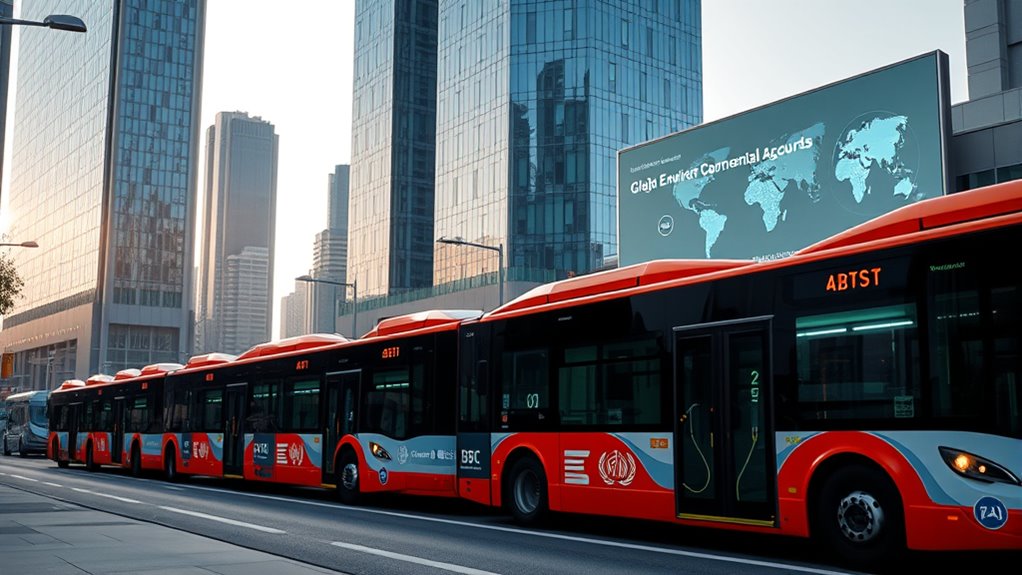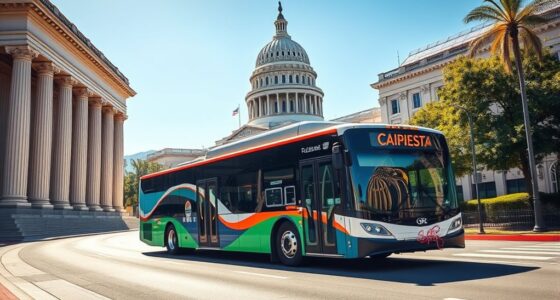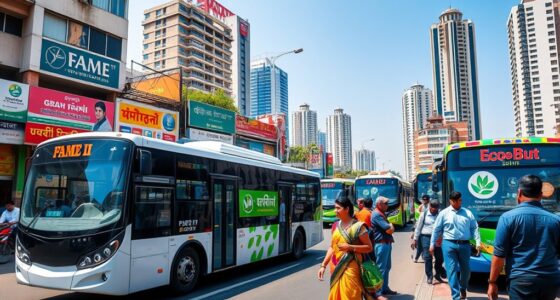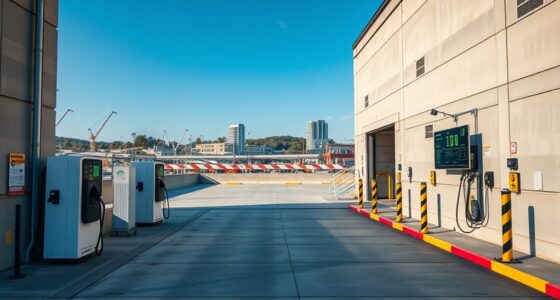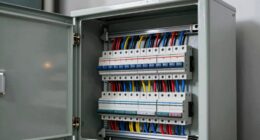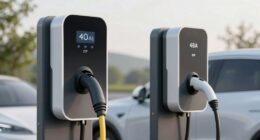International agreements shape your electric bus policies by setting global standards that promote cleaner, sustainable transportation. These agreements encourage countries to adopt renewable energy sources, reduce emissions, and share innovative technology. They also support regulatory frameworks that streamline deployment and guarantee safety. If you explore further, you’ll uncover how these international efforts drive the global shift toward eco-friendly urban transit solutions and foster cooperation among nations for a greener future.
Key Takeaways
- International agreements establish global standards that guide electric bus deployment and policy development worldwide.
- They promote the integration of renewable energy sources in electric bus transportation systems.
- Agreements facilitate international cooperation, technology transfer, and shared best practices for electric bus adoption.
- They support environmental goals by setting targets to reduce emissions and promote sustainable urban mobility.
- International accords strengthen safety protocols and infrastructure resilience, ensuring reliable and secure electric bus networks.

You are trained on data up to October 2023. International agreements play a crucial role in shaping electric bus policies, promoting the adoption of renewable energy sources and reducing greenhouse gas emissions. These accords often set targets and standards that encourage the integration of electric buses into public transportation systems worldwide, fostering sustainable urban development and environmental protection. Additionally, the influence of AI security and safety measures can support the implementation of these policies by ensuring the reliability and resilience of electric bus infrastructure. Furthermore, establishing common regulatory frameworks helps facilitate international cooperation and technology transfer, accelerating the global transition to cleaner transportation options. Incorporating nutritional guidelines in policy frameworks can also support the development of sustainable supply chains for electric vehicle components, ensuring environmentally responsible sourcing and manufacturing.
Frequently Asked Questions
How Do International Agreements Impact Local Electric Bus Manufacturing Standards?
International agreements shape local electric bus manufacturing standards by setting consistent safety, performance, and environmental benchmarks. You’ll find that these standards streamline compliance, reduce costs, and boost efficiency.
They encourage manufacturers to adopt interoperable technologies and meet global quality criteria. As a result, you can produce buses that are safer, more sustainable, and compatible across markets, helping you stay competitive while supporting broader environmental and mobility goals.
What Role Do Trade Tariffs Play in Electric Bus Policy Implementation?
Trade tariffs directly influence electric bus policies by raising costs for key components, prompting manufacturers to adapt sourcing and production strategies. You might see increased local manufacturing or shifts to alternative technologies to avoid tariffs.
Higher prices can slow adoption, while tariffs also create trade tensions that complicate cross-border collaborations. Overall, tariffs shape how governments develop regulations and support for electric buses, impacting market growth and industry innovation.
Are There Financial Incentives Linked to International Climate Agreements?
Think of international climate agreements as a financial GPS guiding your electric bus projects. They offer incentives like climate finance targets, green bonds, and technology transfer, which act as fuel for your initiatives.
For example, climate funds can help cover infrastructure costs. These incentives encourage you to adopt zero-emission buses, reduce costs, and attract private investments, making your shift smoother and more sustainable.
How Do Cross-Border Collaborations Influence Electric Bus Technology Sharing?
You see that cross-border collaborations boost electric bus technology sharing by aligning standards, fostering innovation, and reducing costs.
When companies like InductEV and ENRX partner, they develop compatible wireless charging systems and share technical expertise. This teamwork accelerates technological advancements, promotes market competition, and guarantees easier adoption worldwide.
As a result, you benefit from more reliable, standardized electric buses that meet global needs and support sustainable transportation efforts.
What Challenges Exist in Harmonizing Policies Across Different Countries?
Harmonizing policies across countries presents several challenges. You’ll face a lack of extensive regulations, making it hard to coordinate efforts. Divergent regulatory environments and limited international standards complicate alignment.
Additionally, each country’s unique priorities and economic conditions can hinder unified policy development. Infrastructure gaps and financial constraints further slow progress.
These issues require strong international cooperation and adaptable frameworks to overcome these obstacles and promote consistent electric bus policies worldwide.
Conclusion
So, after all these international agreements aiming to boost electric buses, it’s amusing how progress still lingers. You might think these treaties would swiftly transform urban transit, but here we are—still waiting for that greener, cleaner future. Ironically, while the world signs on the dotted line, actual change often stalls in local politics and industry delays. Maybe, just maybe, the real power lies not in agreements but in our willingness to act beyond paper promises.
